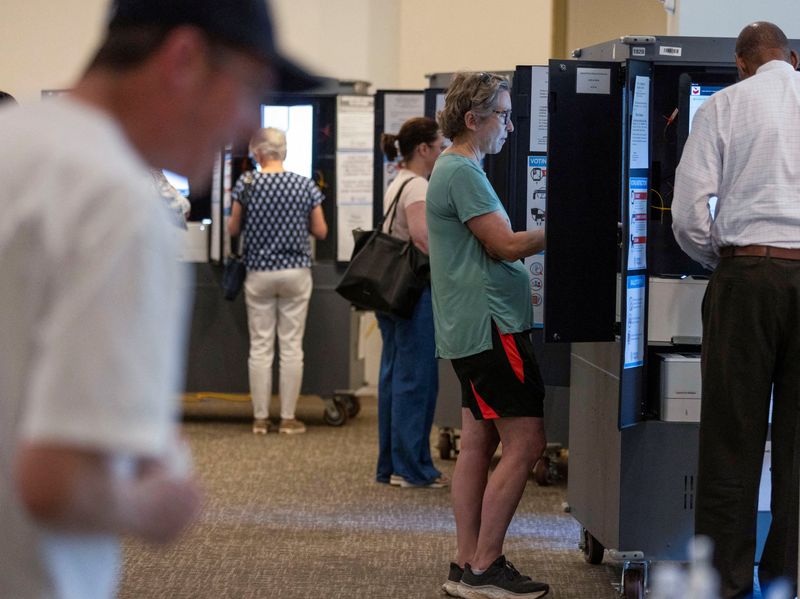[ad_1]
By Christopher Bing and Katie Paul
(Reuters) – A Chinese social media influence operation is impersonating U.S. voters, denigrating U.S. politicians and pushing divisive messages ahead of the Nov. 5 presidential election in the United States, new research by intelligence company Graphika showed.

The campaign is part of a known Chinese state-linked effort analysts have dubbed „Spamouflage” or „Dragonbridge,” which pushes a mixture of spam and targeted propaganda onto the internet.
Spamouflage has been active since at least 2017 but has stepped up its activities as the election approaches, according to experts. It has leveraged thousands of accounts across more than 50 websites, forums and social media platforms.
„The key takeaway from this report,” said Jack Stubbs, who manages Graphika’s research team, is that Spamouflage has „become more aggressive in its efforts to infiltrate and sway U.S. political conversations.”
„This matters because it shows Chinese influence operations targeting the U.S. are evolving, engaging in more advanced deceptive behaviors, and directly targeting these organic but hyper-sensitive rifts in society,” Stubbs added.
In one example highlighted by Graphika, the Chinese operation impersonated American anti-war activists. Using multiple accounts on X, the operatives created memes that labeled Trump a „fraud,” showing him in an orange prison uniform, and called Biden a „coward.”
In halting English, a different account asked: „the present American still our America?” Liu Pengyu, a spokesperson for China’s embassy in Washington, said, „China has no intention and will not interfere in the U.S. election, and we hope that the U.S. side will not make an issue of China in the election.”
Facebook (NASDAQ:) previously attributed the campaign to Chinese law enforcement, calling it „the largest known cross-platform covert influence operation in the world.”
Spamouflage’s messaging does not appear to favor one side of the political spectrum – either Democrats or Republicans – but rather aims to amplify existing criticisms toward American society and government.
Historically, the group had limited success engaging with actual Americans, but that began to change in mid-2023 when the operatives increasingly targeted genuine supporters of former President Donald Trump, according to the Institute for Strategic Dialogue, which has done its own research into Spamouflage.
TRACKING INFLUENCE OPERATIONS
Graphika identified 15 Spamouflage accounts on social media platform X and one account on TikTok, all claiming to be U.S. citizens or media outlets. It also highlighted other profiles associated with those accounts on YouTube and Instagram that were suspended by the time it finished its report.
X did not respond to a request for comment.
A YouTube spokesperson said, “The channel flagged by Graphika was previously identified and terminated as part of our investigations into coordinated influence operations, and had a very small number of views at the time it was removed.”
The Tiktok account, named Harlan Report, was among the group’s most successful assets. It posted a single video in July which garnered 1.5 million views.
That video, which was removed from TikTok last week, mocked a Biden press conference at NATO’s 75th anniversary summit where he stumbled over a speech. Like similar social media posts shared widely at the time, it transcribed Biden’s words erroneously to suggest that he had made a sexual reference, according to a Reuters Fact Check.
A Reuters review of the Harlan Report account on TikTok showed that it posted its first video in May. Other recent videos posted by the account racked up hundreds of thousands of views, including one shared last week showing CNN panelists discussing the network’s interview with Democratic presidential candidate Kamala Harris.
A TikTok spokesperson said the company permanently banned the Harlan Report account for violating its community guidelines.
Meta, the parent company of Facebook and Instagram, confirmed that it had removed Spamouflage activity from its platforms in two places as part of its ongoing enforcement against the operation. Neither was able to gain much traction with authentic audiences, a Meta spokesperson said.

The U.S. government is investigating foreign efforts to interfere in the election.
In July, the U.S. Office of the Director of National Intelligence, released a report on election interference, noting that China was „approaching this U.S. presidential election more cautiously … and probably does not plan to influence the outcome.” However, „we are tracking efforts to influence the U.S. public more broadly.”
[ad_2]
Source link

